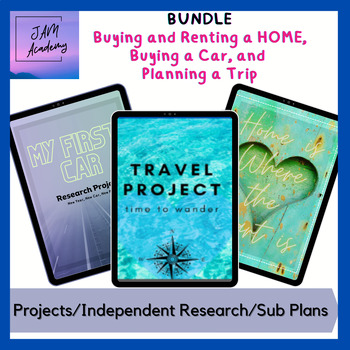Bundle Independent Research - Buy a Car, Buy a House, Plan a Road Trip SUB PLANS
- Zip
Products in this Bundle (3)
Description
These are great as SUB PLANS.
The research project bundle focuses on three important aspects of adult life: buying your first car, buying or renting a home, and planning a trip. Each topic is significant in its own way and requires careful consideration before making a decision.
Research How To Buy Your First Car - an independent, comprehensive product designed to help high school and middle school students, including those with special education needs and ESL students, navigate the process of buying a car for the first time. This guide aims to help you determine your budget, learn vocabulary terms, understand the difference between leasing and financing, decide between buying new or used, explore insurance and maintenance options, and investigate the art of negotiation.
This project is designed to be accessible and easy to understand, with vocabulary terms defined in simple language and step-by-step instructions for each stage of the car buying process. This guide is a valuable resource that can help you make an informed decision about purchasing your first car.
No Prep, Independent Student Research Project Rent Apartment vs Buying a Home
Introducing our student research project on how to rent an apartment and buy a house! This project is specifically designed for middle school and high school students who are interested in gaining knowledge on real estate and property ownership.
This project will provide students with the necessary resources to learn about the process of renting an apartment and buying a house. Students will explore renting and purchasing a place to live. They will understand the pros and cons of each.
The project will provide a step-by-step guide on how to search for and apply for rental properties. Additionally, students will learn about the costs associated with renting, such as security deposits and monthly rent, and the importance of budgeting and financial planning.
Overall, this student research project provides an excellent opportunity for middle school and high school students to gain valuable knowledge and skills related to real estate and property ownership.
Travel Project
This engaging travel research project requires no preparation and encourages students to explore the expenses associated with road trips. Students will be tasked with planning a 5-day/4-night trip to a destination that is within 8 hours of their current location.
Students will be guided through the process of researching and determining the costs of various trip components, including accommodations, meals, fuel, and activities. They will also have the opportunity to make independent decisions based on their allocated budget.





